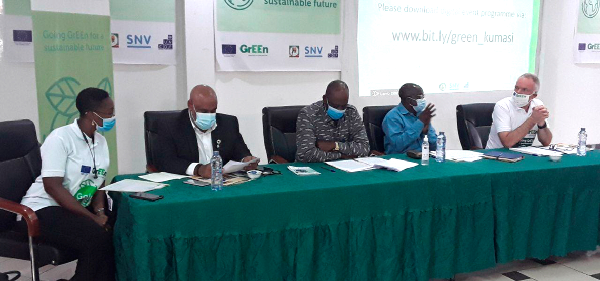
EU launches €20-million programme for 5,000 green jobs
The European Union (EU) and its development partners, with the Ashanti Regional Coordinating Council (WRCC), last Tuesday launched the ‘Boosting Green Employment and Enterprise Opportunities in Ghana’ (GrEEn) project in Kumasi.
The €20-million project aims at promoting green, circular and climate-resilient local economies and is projected to create more than 5,000 jobs.
It is mainly financed by the European Union Emergency Trust Fund (EUTF) for Africa, with contributions from the Embassy of the Kingdom of the Netherlands and the United Nations Capital Development Fund (UNCDF).
The project is targeted at the youth, women and returning migrants of the Western and Ashanti regions who will be trained in green businesses and given financial support to set up their business.
It will focus on areas such as plastic waste recycling, clean cookstove production and distribution, organic horticulture and compost production. Selected Micro, Small and Medium-sized Enterprises (MSMEs) will also be supported.
Beneficiary
In all, 10 districts have been selected to run the programme for a period of four years. Six of the districts are in the Ashanti Region, while the other four are in the Western Region.
Launching the programme, the Deputy Minister of Local Government and Rural Development, Mr. Augustine Collins Ntim, named the beneficiary districts as Adansi South, Offinso North, Sekyere Afram Plains, Sekyere Kumawu, Offinso and Ejura Sekyedumasi, all in the Ashanti Region; and Nzema East, Jomoro, Ahanta West and Wassa East in the Western Region.
He said the project sought to better the lives of the returned migrants and mitigate the devastating effects of climate change in the beneficiary districts.
Climate change
According to the deputy minister, it was common knowledge that climate change was having an adverse impact on energy resources, health, forest carbon reserves and especially on food security.
He said the effect of climate change on the livelihoods of people, particularly those in the rural areas, was the cause of people migrating to seek greener pastures.
“This unfortunate situation is what has contributed to the migration of our young men and women to Europe and other parts of the world to seek better livelihood with disastrous consequences as only few of them reach their destination. Some die in the process while majority of them come back home more disappointed and poorer than they left,” he stated.
Mr. Ntim said for the programme to be successful, there was the need for the regional coordinating councils and the beneficiary districts to take special interest and monitor all the activities under it “to enable us to report appropriately at the national level”.
“For this reason, we have allocated some funds from the ministry’s annual budget for the RCCs to monitor and coordinate activities at the regional level,” he added.
EU
In a recorded message played at the launch, the European Union Ambassador to Ghana, Ms. Diana Acconcia, explained that “the lack of job opportunities pushes young people to look for a better future far from home. Climate change makes things worse by taking away the main source of livelihood in many communities”.
“These two challenges are interlinked. We need to address them at the same time if we want to convince young people that they have a future at home and prevent them from embarking on dangerous journeys where they can lose their lives,” she added.
The programme, therefore, according to her, was to provide that group of people with the skills and training required to set up enterprises.
According to the Country Director of SNV, the implementers of the programme, Mr. Anjo van Toorn, “The GrEEn project is very topical since it supports youth, women and returning migrants in creating jobs and supporting businesses in a time COVID-19 is impacting hard on local economies.”
He said the project would contribute to climate-resilient economies which could withstand and reduce climate impact in the short and long term as “this is essential to community well-being now and later”.
Implementation
The Ashanti Regional Minister, Mr. Simon Osei Mensah, also charged the beneficiary districts to ensure that they implemented the programme to the letter to enable it to reach more people.
He asked them to integrate the programme into the medium-term programmes of the assemblies so that it could be sustained when the initial programme came to an end.
